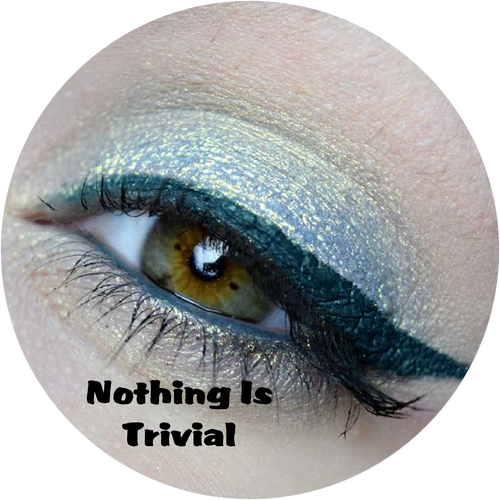

Trivia is a word in Latin, the (neuter) plural of trivium “crossroads, intersection,” and the feminine singular of the adjective trivius “pertaining to a trivium ” (especially used as an epithet of the goddess Diana). Regarded as a three-part deity, Diana has been known by various names, including Diana Trivia and simply Trivia. Few of us want to admit we think like this, but it would do us well to admit we are largely an entitled bunch. The Nothing Trivial finale certainly threw a few challenges at pub quiz team Sex On A Stick, but ultimately they stuck with happy endings for everyone. As the story unfolds, it becomes evident these mates have more than a simple weekly tradition in common in fact, they have all been unlucky in love. So we pray for everything we wanttrivial or notas though God is our divine concierge whose job is to make our earthly stay more comfortable. Nothing Trivial follows five friends, all in their 30s and 40s, who meet and compete against each other in a weekly pub quiz.

The equivalent of Hecate in Roman mythology is Diana (especially one of Diana’s multiple personae). It’s not unpopular to believe God wants us to be comfortable and happy. In Greek mythology, Hecate, who is associated with the moon and the netherworld, presides over (three-way) crossroads, doorways, magic, witchcraft, necromancy, and sorcery, and is mentioned as such by Shakespeare in A Midsummer Night’s Dream, King Lear, and Macbeth. The Latin adjective triviālis, “pertaining to a crossroads or to public streets common, vulgar, ordinary,” is a derivative of the classical Latin noun trivium meaning “the place where three roads meet, crossroads, intersection,” also “the street corner, the gutter (where bad character and manners are formed, and boys and young men ruined),” and finally the place sacred to the goddess Hecate. This Medieval Latin sense of trivium dates from the Carolingian Renaissance of the late 8th century at the court of Charlemagne. He was playing the usual, common, “trivial” sense of trivial, “insignificant,” against its original English sense “pertaining to the trivium,” trivium being the first three of the seven liberal arts in the medieval university curriculum: (Latin) grammar, (Latin) rhetoric, and logic, so called because these subjects formed the “triple road to eloquence” ( triplex via ad eloquentiam ). They are quadrivial” is one of James Joyce’s innumerable puns.


 0 kommentar(er)
0 kommentar(er)
